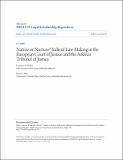|
Reseña:
|
Are international courts (ICs) by nature expansionist lawmakers, expanding the reach and scope of their authority at the expense of state sovereignty when permissive conditions allow? Or are they naturally conservative, applying international law in straightforward and circumscribed ways unless environmental factors encourage them to be more expansive? We investigate expansionist lawmaking patterns in the European Court of Justice (ECJ) and the Andean Tribunal of Justice (ATJ), the ECJ’s jurisdictional twin and the third most active IC. We argue that international judges are more likely to become expansive lawmakers when they are supported by influential sub-state interlocutors and compliance constituencies. These intermediaries include national judges, administrative agency officials, and private actors who have a personal, professional or ideological stake in promoting respect for international rules. Our study investigates lawmaking across all ATJ preliminary rulings through 2007 and analyzes the political effects of cloning the ECJ in regions outside of Europe. |

